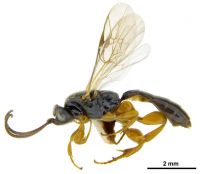ICHNEUMONIDAE: : Sciron Fitton 1984
Diagnosis:
Characteristics of Sciron include: 1. Body size <10mm; 2. Position of spiracle on T1 at, close to, or before centre; 3. Shape of aerolet in forewing triangulate; 4. Colour of face only black; 5. Metasoma compressed somewhat dorsal-ventrally; 6. Size of ocelli small; 7. Length of antennae shorter than body; 8. Length of ovipositor barely visible; 9. Wings present; 10. Colour of wings hyaline (clear); 11. Sternaulus absent; 12. Shape of face in lateral view strongly bulging ; 13. Sternite on T1 (viewed laterally) not extending past spiracle; 14. Shape of T1 (viewed laterally) evenly curved; 15. Number of teeth in mandibles 2; 16. Metasoma same colour throughout; 17. Length of T1 vs T2 subequal in length; 18. Sculpture on mesoscutum finely pitted, many hairs; 19. Width of T1 (viewed dorsally) gradually widening from anterior to posterior; 20. Glymma on T1 present, (deep pit); 21. Sculpture on metasoma punctured (sometimes less densly or densly punctured); 22. Propodeum very short (not reaching beyond coxal insertion).Similarity to Other Taxa
Sciron (and other genera of the subfamily Metopiinae) have a 'bulging face', which seperates them from almost all other genera. Sciron can be seperated from other genera of the subfamily Metopiinae by using the key of Berry (1990).Some small Aucklandella also have a 'bulging face' but these species have colourful bodies (Metopiinae are black), and they also have the spiracle of T1 well behind the centre (in Metopiinae the spiracle on T1 is at, close to, or before centre).
Stenomacrus (Orthocentrinae) also has a bulging face. However, it can be seperated from genera of the subfamily Metopiinae which have a small triangular process between the antennae, and the malar space lacks a subocular groove.
Compare
-

Hypsicera
Have transverse carina on the propodeum, these are absent in Sciron (either: only longititudinal carina present, or no carina). In Hypsicera the areolet is open in the forewing. -

Carria
Sciron have a more elongate T1 (2x as long as its width), compared to Carria where T1 is approximately as long as wide. Sciron also have the occipital carina present (at least dorsally), whereas it is completely absent in Carria.
Distribution in NZ
North Island: AK, WN. South Island: NN, BR, FD.
Species in NZ
Two endemic species: Sciron enolae Berry 1990, and S. glaber Berry 1990.Biology & hosts
A relatively large genus in Australia (Gauld 1984), with two species in New Zealand (Berry 1990). No hosts are known for the New Zealand species and they are uncommon, with less than twenty specimens in the NZAC.Sources of information
Berry JA. 1990. The New Zealand species of the subfamily Metopiinae (Hymenoptera: Ichneumonidae). New Zealand Journal of Zoology 17: 607-614.Gauld ID. 1984. An Introduction to the Ichneumonidae of Australia. London, British Museum (Natural History). 413 p.
Ward DF, Early JW, Schnitzler FR, Hitchmough RA, Stringer IAN. 2012. Conservation status of New Zealand Hymenoptera. New Zealand Entomologist 35 (2):116-119.
Citation
Ward DF & Schnitzler FR. 2013. Ichneumonidae of New Zealand. Genus Sciron http://ichneumonidae.landcareresearch.co.nzAccessed: 27 April 2025



